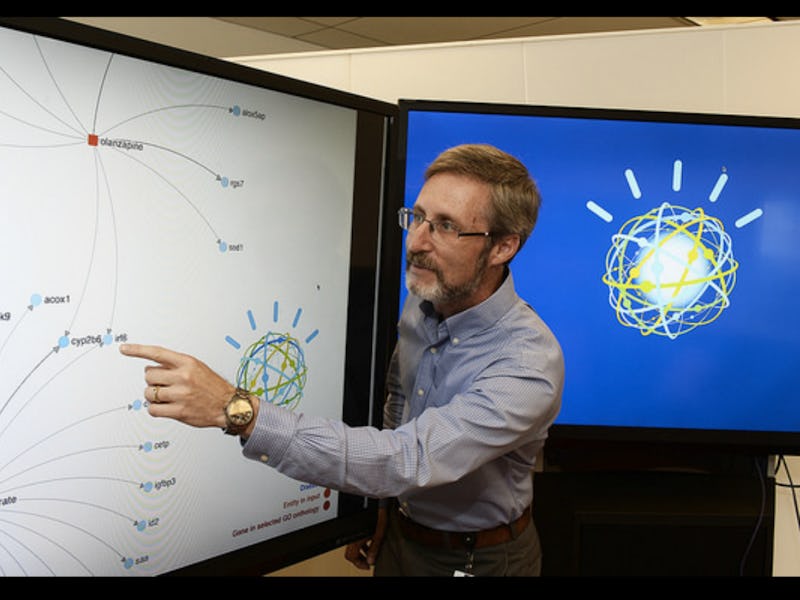How to Get Advice From Watson, IBM's Famously Smart AI
A genius cognitive computer, here to help.

In 2011, IBM stole the artificial intelligence show when Watson, a talking cognitive computer, won Jeopardy! By feeding the computer millions of pages of unstructured data — that is to say, no numbers or values neatly organized in spreadsheets — the company “taught” Watson everything he needed to thoroughly whack human Jeopardy! champion Ken Jennings. For the first time ever, a computer with some sense of understanding of the world was not only on display, it was on television.
The Jeopardy! win was a huge PR success for the company, which has since spun Watson’s technology into a cloud service that developers can use to create applications that make use of natural input, like human speech, in order to find answers to all kinds of questions. At present, some 80,000 developers and 500 businesses are using this cloud to create the next generation of smart apps that can make use of language, speech, vision, and data that seem sure to become powerful, useful pieces of software.
It’s as though we are sitting on the precipice of a time when it will become easy — perhaps even boring — to speak to your computer as you might speak to a coworker, and to have that speech turned into useful action. This is not yet so common at present, but listen up: you can kinda-sorta talk to Watson today.
IBM recently partnered with Hilton to develop a robotic concierge named “Connie” that makes use of the Watson API to greet hotel guests and answer their questions about hotel offerings. In order to more easily facilitate human-machine interaction, Connie is in robot form, but it could’ve been anything, even a mobile app.
We asked Steve Abrams, IBM’s Watson Ecosystem Director, which conventional mobile apps tap into Watson’s expansive abilities. He says that more than 100 partners have already introduced Watson-powered apps and products to the market. Among these are ROSS, a legal advisor app that lawyers can ask questions of to obtain a natural language response in realtime. The name of the game with an app like this is to save lawyers’ time and to streamline the legal research process. You (or the lawyer in your life) can sign up here to get early access to ROSS.
Another standout is WayBlazer, a travel search and discovery company that uses Watson’s technology to absorb loads of data, sorting and organizing destinations, discounts, and a traveler’s preferences. Watson technology essentially helps you plan an affordable, enjoyable vacation by looking at far more travel options than you ever could in a reasonable amount of time.
Even though Watson’s Jeopardy! voice was developed by testing 25 voice actors and “fine-tuning frequencies to strike the appropriate tone,” it does not appear you’ll hear it at home anytime soon. If your goal is to have some kind of conversation with Watson, maybe to ask him about the meaning of life, then you’re unfortunately out of luck. While Watson has already proven very handy at the game of Jeopardy!, he is so far not adapted to the Turing test. Computers running chatbot software that can respond to a human’s conversational input in a convincingly human way are said to have “passed the Turing test.” This has happened with other software in the past, but it doesn’t appear to be a direction IBM is interested in investigating yet.
“The real work begins when we see the implications of these technologies in the real world, extending innovative technologies to tackle societal challenges like improving health care, education and the environment,” says Abrams. “We believe that when machines win, humans win, and we’re primarily focused on empowering developers with platforms that are truly self-service and superior in three important ways: science, scale, and simplicity.”
Watson’s cognitive APIs understand, reason, and learn in a way similar to your own human brain. IBM’s latest developments with this API spookily go even deeper: developers riding the cutting edge of Watson technology can simulate emotional intelligence via software.
“From our perspective, the future is a blank slate for us to continuously explore and enhance the collaborations between man and machine,” Abrams says.